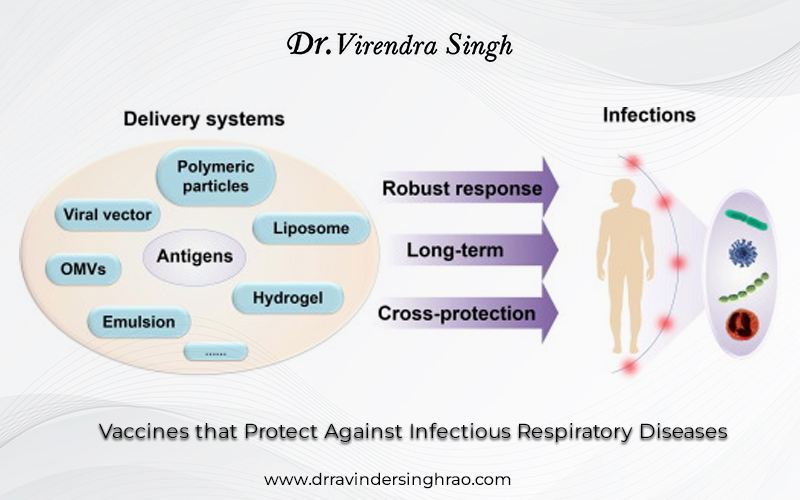
Vaccines play a critical role in protecting against infectious diseases by stimulating the immune system to recognize and combat specific pathogens. The majority of diseases that can be prevented by vaccination are transmissible, meaning that if one member of a community contracts an infectious disease, they may infect others. The best way to help stop the spread of certain diseases is through vaccination. A vaccine-preventable disease has a lower risk of spreading if enough people receive vaccinations, keeping everyone healthy. These vaccines, such as those for influenza, pneumonia, and COVID-19, have proven to be highly effective in reducing the incidence and severity of these illnesses. Vaccines teach the body to react fast and effectively when exposed to the actual virus by providing weakened or inactivated virus forms, or even only certain pathogen components like proteins.
This proactive measure not only keeps the person from getting really sick, but also slows the disease’s transmission across the community. Vaccination campaigns have been instrumental in controlling outbreaks, safeguarding vulnerable populations, and ultimately saving millions of lives globally. Dr. Virendra Singh, a renowned expert in respiratory medicine, offers a comprehensive guide on vaccines that protect against infectious respiratory diseases. He emphasizes the critical impact immunizations play in avoiding infections including influenza, pneumonia, and COVID-19. He has decades of experience and substantial research in the field.
His guidance explores the science underlying vaccinations, elucidating the immunization procedure and the body’s reaction to these preventative measures. Dr. Virendra Singh highlights the importance of widespread vaccination in achieving herd immunity, thereby reducing the transmission of diseases within communities.
Understanding Respiratory Viruses
Infectious respiratory diseases such as influenza, COVID-19, and RSV spread from person to person. Find out how your immune system responds to various infections and about some of the typical side effects you could encounter.
How Vaccines Work
There are several kinds of vaccines. Some still include disease-causing bacteria, but they’ve been rendered inert or weakened. Some contain genetic material from the germ or a safe portion of it (like the synthesized messenger RNA used in some COVID-19 vaccines). Your immune system is boosted by a vaccine, which causes you to create the same antibodies you would if you were exposed to the actual illness. It assists your body learn to recognize and fight an invasion of a particular germ. Consequently, you can acquire immunity to that illness without first contracting it.
What Vaccines Do Adults Need?
Discuss your particular needs with your healthcare practitioner. Adult immunizations to think about include:
- COVID-19: The coronavirus disease 2019 (COVID-19) vaccination may shield you against contracting the illness, from getting very sick from it, or from dying from it.
- Flu (Influenza): The coronavirus disease 2019 (COVID-19) vaccination may shield you against contracting the illness, getting very sick from it, or dying from it. The flu can cause serious complications in older adults.
- Hepatitis B: The hepatitis B vaccine is advised for all people between the ages of 19 and 59 by the CDC. Adults 60 years of age and older with hepatitis B risk factors are also advised to get the vaccine. It is not specifically recommended for those age 60 and older without known risk factors. However, if you fall into such a category, you can choose to have the hepatitis B vaccination. Hepatitis B is a disease that affects the liver.
- Human Papillomavirus (HPV): The HPV vaccine is advised by the CDC for boys and girls who are 11 or 12 years old. Three doses of the vaccine are recommended for teens and young adults who start the vaccination series later, between the ages of 15 and 26. For both genders, ages 9 to 45, the Food and Drug Administration has authorized the Gardasil 9 HPV vaccine. Cancer can result from the common virus HPV.
- Pneumococcal Vaccine: The CDC recommends the pneumococcal vaccines-there are two- for adults age 65 and older. A dosage of the vaccine may also be required for younger adults who are more susceptible to pneumococcal illness. Infections like meningitis, pneumonia, and bloodstream infections are brought on by pneumococcal illness.
- Shingles: For healthy people 50 years of age and older, the CDC advises the Shingrix vaccine as a means of preventing shingles. It’s given in two doses. While not life-threatening, shingles can be very painful.
- Tetanus, Diphtheria, Pertussis (Tdap): At the age of eleven or twelve, a single Tdap dose is normal. The CDC advises obtaining a Tdap vaccination as soon as possible if you have never had one. It is also advised to have one dose of the Tdap vaccine every pregnancy, preferably between weeks 27 and 36. The tdap vaccine can shield you from respiratory complications caused by diphtheria, whooping cough (pertussis), and lockjaw (tetanus). It is advised to have a booster every ten years.
Why Vaccines are Important For Adults with Lung Disease
Individuals who suffer from respiratory conditions like COPD or asthma may be more vulnerable to severe illnesses that can be prevented by vaccination. It’s critical to maintain current immunization records for the following diseases for optimal protection:
- COVID-19- To protect against severe COVID-19 illness.
- Influenza- To safeguard against the seasonal flu every year.
- Pneumococcal Pneumonia- To protect against the most common type of bacterial pneumonia.
- RSV- Help shield persons 60 years of age and older from serious RSV sickness.
- Tdap- To safeguard against Diphtheria, Tetanus, and Pertussis (whooping cough)
- Zoster- To protect against shingles.
Diseases that can be prevented by vaccinations can result in hospital stays, long-term sickness, the worsening of pre-existing chronic disorders, and even death. Talk with your healthcare provider to be sure you are up to date with all recommended vaccinations for you.
FAQs
How do vaccines protect against infectious respiratory diseases?
Vaccines function by encouraging the immune system to identify and combat particular infections. They introduce a portion, or an inactivated or weakened version, of the virus, teaching the body to react swiftly and efficiently in the event of a genuine virus exposure, thus averting serious illness and slowing the spread of disease.
What are some common vaccines for respiratory diseases?
Common vaccines include those for influenza (flu), pneumococcal disease (pneumonia), pertussis (whooping cough), and COVID-19. These vaccinations are all designed to combat particular viruses or bacteria that cause respiratory illnesses.
Are vaccines safe?
Yes, vaccines undergo rigorous testing in clinical trials to ensure they are safe and effective. The data are reviewed by regulatory bodies such as the FDA and WHO prior to being approved for public use. The majority of side effects are modest and transient, such as injection site discomfort or a slight fever.
Who should get vaccinated against respiratory diseases?
Everyone should get vaccinated, but it is especially important for those who are more vulnerable to serious illness, such as small children, the elderly, those with long-term medical disorders, and healthcare professionals. Specific recommendations may vary based on the disease and vaccine.
How long does vaccine protection last?
The duration of protection varies by vaccine. Certain vaccinations, such as the flu shot, are advised yearly because virus strains might change. Some, like the pneumococcal vaccine, require fewer doses to offer long-term protection. Booster shots may be required to maintain immunity for some vaccines.
